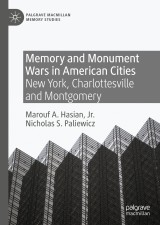Details

Memory and Monument Wars in American Cities
New York, Charlottesville and MontgomeryPalgrave Macmillan Memory Studies
|
64,19 € |
|
| Verlag: | Palgrave Macmillan |
| Format: | |
| Veröffentl.: | 16.09.2020 |
| ISBN/EAN: | 9783030537715 |
| Sprache: | englisch |
Dieses eBook enthält ein Wasserzeichen.
Beschreibungen
This book is about the ways U.S. cities have responded to some of the most pressing political, cultural, racial issues of our time as agentic, remembering actors. Our case studies include New York City’s securitized remembrances at the National September 11 Memorial and Museum; Charlottesville’s Confederate monument controversies in the wake of the 2017 Unite the Right Rally; and Montgomery’s “double consciousness” at the National Memorial for Peace and Justice and Legacy Museum. By tracing the genealogies that can be found across three contested cityscapes—New York, Charlottesville, and Montgomery—this book opens up new vistas for research for communication studies as it shows how cities are agentic actors that can wage “war” on urban landscapes as massive actor-networks struggling to remember (and forget). With the rise of sanctuary cities against nativistic immigration policies, “invasions” from white supremacists and neo-Nazis objecting to “the great replacement,” and rhizomic uprisings of Black Lives Matter protests in response to lethal police force against persons of color, this timely book speaks to the emergent realities of how cities have become battlegrounds in America’s continuing cultural wars.
<p>Chapter 1: Introduction: U.S. Cities’ Agentic Role in 21st Century Memory and Monument Wars.- Chapter 2: The Fortification of New York City: Post-9/11 Memorialization and the Localization of the War on Terror.- Chapter 3: Civil Lawfare, Remembrances of Lost Causes, and Charlottesville’s Confederate Monument Controversies.- Chapter 4: Montgomery, “Racial Terror” Lynching Remembrances, and Municipal Quests for American Truth and Reconciliation.- Chapter 5: The Future Roles of Remembering and Forgetting for Agentic 21st Century Cities.</p>
<p><b>Marouf A. Hasian Jr.</b> is Distinguished Professor and Co-Chair of communication at the University of Utah, USA. He is author of <i>Restorative Justice, Humanitarian Rhetorics, and Public Memories of Colonial Camp Cultures </i>(2014), and more than a dozen other books.<br></p><p></p>
<p> </p>
<p><b>Nicholas S. Paliewicz</b> is Associate Professor in the Department of Communication at the University of Louisville, USA. He is co-author of <i>The Securitization of Memorial Space</i> and <i>Racial Terrorism: A Rhetorical Investigation of Lynching</i> (2019) and has authored essay in journals such as <i>Argumentation and Advocacy</i>,<i> Communication and Critical/Cultural Studies</i>,<i> International Journal of Communication</i>, and<i> Environmental Communication</i>.</p>
<p> </p>
<p><b>Nicholas S. Paliewicz</b> is Associate Professor in the Department of Communication at the University of Louisville, USA. He is co-author of <i>The Securitization of Memorial Space</i> and <i>Racial Terrorism: A Rhetorical Investigation of Lynching</i> (2019) and has authored essay in journals such as <i>Argumentation and Advocacy</i>,<i> Communication and Critical/Cultural Studies</i>,<i> International Journal of Communication</i>, and<i> Environmental Communication</i>.</p>
This book is about the ways U.S. cities have responded to some of the most pressing political, cultural, racial issues of our time as agentic, remembering actors. Our case studies include New York City’s securitized remembrances at the National September 11 Memorial and Museum; Charlottesville’s Confederate monument controversies in the wake of the 2017 Unite the Right Rally; and Montgomery’s “double consciousness” at the National Memorial for Peace and Justice and Legacy Museum. By tracing the genealogies that can be found across three contested cityscapes—New York, Charlottesville, and Montgomery—this book opens up new vistas for research for communication studies as it shows how cities are agentic actors that can wage “war” on urban landscapes as massive actor-networks struggling to remember (and forget). With the rise of sanctuary cities against nativistic immigration policies, “invasions” from white supremacists and neo-Nazis objecting to “the great replacement,” and rhizomic uprisings of Black Lives Matter protests in response to lethal police force against persons of color, this timely book speaks to the emergent realities of how cities have become battlegrounds in America’s continuing cultural wars.<b></b><p></p>
<p><b> </b></p>
<p><b>Marouf A. Hasian Jr.</b> is Distinguished Professor and Co-Chair of communication at the University of Utah, USA. He is author of <i>Restorative Justice, Humanitarian Rhetorics, and Public Memories of Colonial Camp Cultures </i>(2014), and more than a dozen other books. </p>
<p> </p>
<p><b>Nicholas S. Paliewicz</b> is Associate Professor in the Department of Communication at the University of Louisville, USA. He is co-author of <i>The Securitization of Memorial Space</i> and <i>Racial Terrorism: A Rhetorical Investigation of Lynching</i> (2019) and has authored essay in journals such as <i>Argumentation and Advocacy</i>,<i> Communication and Critical/Cultural Studies</i>,<i> International Journal of Communication</i>, <i>and Environmental Communication</i>.</p>
<p><b> </b></p>
<p><b>Marouf A. Hasian Jr.</b> is Distinguished Professor and Co-Chair of communication at the University of Utah, USA. He is author of <i>Restorative Justice, Humanitarian Rhetorics, and Public Memories of Colonial Camp Cultures </i>(2014), and more than a dozen other books. </p>
<p> </p>
<p><b>Nicholas S. Paliewicz</b> is Associate Professor in the Department of Communication at the University of Louisville, USA. He is co-author of <i>The Securitization of Memorial Space</i> and <i>Racial Terrorism: A Rhetorical Investigation of Lynching</i> (2019) and has authored essay in journals such as <i>Argumentation and Advocacy</i>,<i> Communication and Critical/Cultural Studies</i>,<i> International Journal of Communication</i>, <i>and Environmental Communication</i>.</p>
Outlines how U.S. cities have responded to some of the most pressing political, cultural, racial issues of our time Explains how cities are agentic actors that can wage “war” on urban landscapes as massive actor-networks struggling to remember (and forget) Speaks to the emergent realities of how cities have become battlegrounds in America’s continuing cultural wars
Diese Produkte könnten Sie auch interessieren:

Communicating Science in Social Contexts

von: Donghong Cheng, Michel Claessens, Nicholas R. J. Gascoigne, Jenni Metcalfe, Bernard Schiele, Shunke Shi

149,79 €















